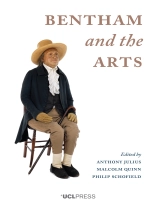Bentham and the Arts considers the sceptical challenge presented by Bentham’s hedonistic utilitarianism to the existence of the aesthetic, as represented in the oft-quoted statement that, ‘Prejudice apart, the game of push-pin is of equal value with the arts and sciences of music and poetry. If the game of push-pin furnish more pleasure, it is more valuable than either.’ This statement is one part of a complex set of arguments on culture, taste, and utility that Bentham pursued over his lifetime, in which sensations of pleasure and pain were opposed to aesthetic sensibility. Leading scholars from a variety of disciplines reflect on the implications of Bentham’s radical utilitarian approach for our understanding of the history and contemporary nature of art, literature, and aesthetics more generally.
Each contributor takes into account, from the perspective of their own discipline and expertise, the implications for their research area of the views contained in Bentham’s Of Sexual Irregularities, and other writings on Sexual Morality (published in the authoritative edition of The Collected Works of Jeremy Bentham in 2014) and ‘Not Paul, but Jesus: Volume III’ (published online by the Bentham Project in 2014). In these essays, Bentham puts forward the first philosophical defence of sexual liberty. In doing so, he questions the meaning of ‘taste’ and hence the received understanding of aesthetics more generally.
The contributors, moreover, challenge two of the major commonplaces in literary and historical studies of the nineteenth century: first that literature and utilitarianism represented alternative and incompatible views of the world; and second that Bentham’s utilitarianism was somehow emaciated in comparison with that of John Stuart Mill. The volume also includes new reflections on the auto-icon and the panopticon, the latter showing the utilitarian genealogy of a collaborative art and architecture project on the site of the Millbank Penitentiary.
The title ‘Bentham and the Arts’ itself challenges the commonly held notion that Bentham had nothing relevant to say on the subject of the Arts – the essays in this volume show that Bentham remains extraordinarily relevant, both in historical and philosophical terms.
Praise for Bentham and the Arts
‘Bentham and the Arts is a feast. Ranging from poetry and sexual nonconformity to the auto-icon and public sculpture, from Hume, Kant, and de Staël to Freud and Michel Onfray, an excellent crew of contributors brings Jeremy Bentham out from the shadow cast by John Stuart Mill with much new to say on taste and politics. Highly recommended for students and scholars alike, this fine interdisciplinary volume is available to all through open-access publishing.’
Stephen Engelmann, University of Illinois at Chicago
‘The essays offer a very rich and stimulating reappraisal of the relationship between Bentham – and, more broadly, Utilitarianism – and the arts.’
Journal of Bentham Studies
‘…A milestone in scholarship on utilitarianism and art history. … Not only made more enjoyable by the wide range of quality illustrations [but] most of all provides a revisionist and conclusive analysis of the field, and as such should be read by all.’
La Revue d’études benthamiennes
‘after reading the arguments of these eleven writers, I rest my case and declare Bentham being happy: they have done justice, freed him from the monopoly of Millian utilitarianism, and proved his philosophy to be rooted in transgressive tendencies and values’
Annals of the University of Bucharest, Philosophy Series
Tabella dei contenuti
List of contributors
List of figures
Acknowledgements
Introduction
Philip Schofield
Part I. Philosophy and Sexuality 1. The Epicurean Universe of Jeremy Bentham: Taste, Beauty, and Reality
Philip Schofield
2. Not Kant, but Bentham: On Taste
Frances Ferguson
3. ‘Envy Accompanied with Antipathy’: Bentham on the Psychology of Sexual Ressentiment
Stella Sandford
Part II. Intellectual History and Literature 4. Literature, Morals, and Utility: Bentham, Dumont, and de Staël
Emmanuelle de Champs
5. Jeremy Bentham’s Imagination and the Ethics of Prose Style: Paraphrase, Substitution, Translation
Jan-Melissa Schramm
6. ‘Is It True? … What is the Meaning of it?’: Bentham, Romanticism, and the Fictions of Reason
Tim Milnes
7. More Bentham, Less Mill
Anthony Julius
Part III. Aesthetics, Taste, and Art 8. Enlightenment Unrefined: Bentham’s Realism and the Analysis of Beauty
Malcolm Quinn
9. Jeremy Bentham’s Principle of Utility and Taste: an Alternative Approach to Aesthetics in Two Stages
Benjamin Bourcier
10. From Pain to Pleasure: Panopticon Dreams and Pentagon Petal
Fran Cottell and Marianne Mueller
11. Bentham’s Image: the Corpo-Reality Check
Carolyn Shapiro
Index
Circa l’autore
Philip Schofield is Director of the Bentham Project, Faculty of Laws, UCL, and General Editor of the new authoritative edition of The Collected Works of Jeremy Bentham.












